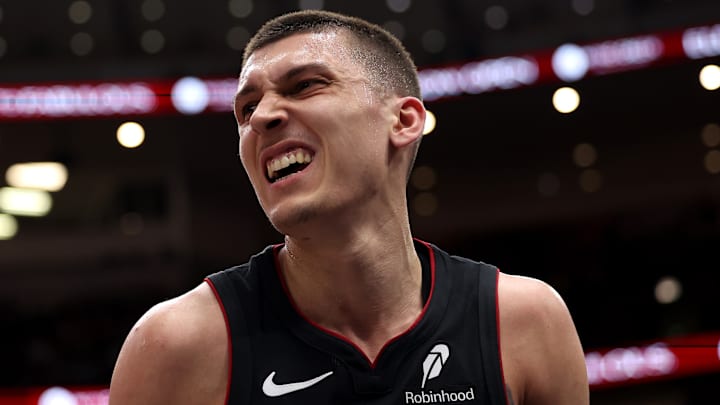Tyler Herro is eligible as of October 1 to sign a three-year extension with the Miami Heat worth nearly $150 million. If the team's other offseason activity is any indication, he's not getting it.
This isn’t just in reference to the full $150 million, either. We are talking about Herro getting an extension, period.
Even if he’s willing to take less, the Heat have telegraphed their plans for the future. And their blueprint includes opening up cap space next summer, if not during the 2027 offseason.
The Heat may not want to give up cap space
Extending Herro on any type of deal runs in stark contrast to this approach. He is already on the books for 2026-27, but he’s scheduled to come off the ledger during 2027 free agency. Bam Adebayo is the only Miami player owed guaranteed money that summer. The Heat, in theory, could have over $90 million in spending power.
Putting Herro on the docket at any type of price—a max extension would pay him $46.2 million that year—substantially knives into that space. Miami must weigh whether maintaining that flexibility is worth the risk of him leaving for nothing, or having to re-sign him on a longer, more expensive deal.
Herro’s max salary in Year 1 of a new deal if he enters 2027 free agency would be $53.1 million. A four-year deal from the Heat could run $237.9 million. A five-year deal could go as high as $308.1 million. This isn’t to say Herro would have the leverage to command all of that coin, but the prospect of a longer payday must factor into Miami’s decision-making.
Extending Tyler Herro could nuke Miami’s trade options
Then again, Herro’s extension isn’t just about maintaining cap flexibility down the line. It is also about maximizing Miami’s trade options.
If Herro signs a new deal, he can’t be moved for six months. Since an agreement cannot be reached until October, this takes his restriction past the February 5 trade deadline. Signing an extension automatically takes him off the table in any midseason deals.
This is problematic for the Heat, even if they’re not actively looking to move him. Superstars aren’t changing teams anymore by leaving in free agency. They are getting traded. With only two movable first-round picks at their disposal until next summer (2029, and 2031 or 2032), they need to keep all of their options open—particularly if the endgame remains landing a certain someone with two MVPs and an NBA title.
All of that works against Herro getting an extension. That doesn’t change even if the Heat are resigned to waiting until next summer for a big swing. A new deal for Herro puts him on the books for multiple years, and a team selling off its superstar and entering a rebuild may prefer the value and flexibility he brings as an expiring contract.
Rest assured, Miami’s All-Star guard will be paid at some point. It just isn’t happening before next season. And frankly, that payday may never come from the Heat.
